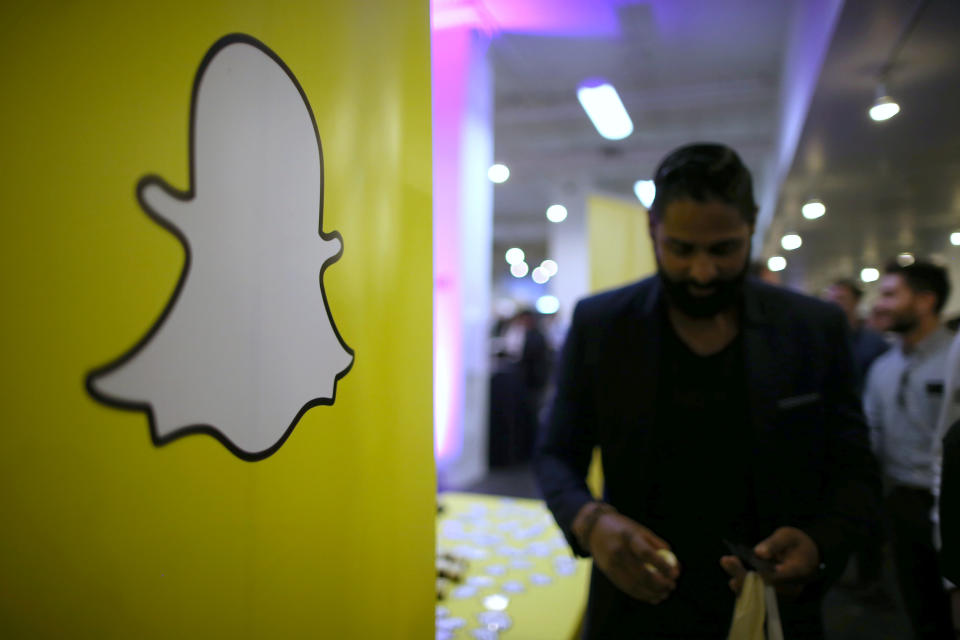Hedge fund manager explains why he's eager to bet on Snap
Despite the lack of voting rights, Snap shares have captured the imagination of some professional investors.
Tech-focused hedge fund manager Sean Stiefel, a portfolio manager with New York-based Navy Capital, plans to buy shares of SnapChat’s parent company in its initial public offering.
Snap Inc., the owner of the popular photo and video messaging app, priced at $17 per share, above the indicated price range of $14-$16. At that price, it gives the company a valuation close to $24 billion. Shares will start trading on Thursday under the ticker symbol “SNAP“.

“I think that it’s very exciting given there’s not a lot of ways to play the theme of growth of images, [specifically] in the way that we interpret images and the way we interpret the way those images are used to sell things to us,” Stiefel told Yahoo Finance on Wednesday.
“SnapChat positioned itself, at least anecdotally, as the most interesting place to put an image,” he added.
SnapChat is an app lets its users, who tend to be teenagers and millennials, send photos and videos with text messages to their friends that vanish in a matter of seconds. The app lets users play with different filters, including one that gives you a dog’s ears, nose, and a tongue.
Last year, Snap averaged 158 million daily active users.
Stiefel thinks SnapChat has the potential to be the biggest source of user generated images.
“I personally upload more pictures to SnapChat than to Instagram or Facebook,” he said. “Think of all the ways an advertiser can take data from that.”
What’s more, SnapChat can be the “go-to innovators” in this space, he said.
“Monetization will come. I have no doubt.”
Snap said that for the year ended December 31, 2016, revenue totaled $404.5 million. Snap’s loss per share for the year was $0.53. The cost of revenue was $451 million.
“From an advertising perspective, the monetization will come. I have no doubt. For now, you’re making a bet on a company’s ability to innovate,” Stiefel said.
He added that he recently returned from a trip to Israel where he met with businesses that make components for phones.
“Everything on that trip—and what we think about as a firm holistically—is the growth of the image. Everyone is building phones around being able to take images.”

Snap, which has billed itself as a “camera company” as opposed to a social media company, makes “a lot of sense,” according to Stiefel.
As for those in the investment community who are skeptical, especially regarding the valuation, Stiefel believes they’re “missing the broader theme.”
“The valuation, given where the company is in the lifecycle, is not easy to justify because it’s very early in the lifecycle of SnapChat. However, when you think about a $20 billion valuation compared to some of the other similar pays that have gone public, that’s very reasonable given the size of this market.”
He added that Snap is “at the forefront of a secular theme.” That theme, of course, being the image.
“Given that I think Snap—as opposed to Twitter (TWTR), Yelp (YELP), or Pandora (P)— Snap is at the forefront of the secular theme being the image. Twitter came at the tail-end of the written word. Pandora is trying to play the radio game, which is not necessarily going away but it’s certainly not growing,” he said, adding, “Snap and images and image taking and the way we use images has barely even started.”
Stiefel thinks that investors, especially tech and media investors, are looking for ways to get exposure to advertising outside of linear television.
As for shareholders not getting any voting rights, Stiefel is not all that concerned.
“For now this is an innovation story,” he wrote in an email. “One day it may matter but for our size and where we are in the life cycle right now it does not effect our investment decision.”

 Yahoo Finance
Yahoo Finance 
